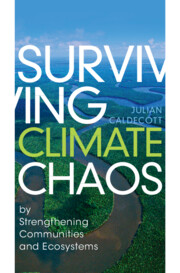Book contents
- Surviving Climate Chaos
- Surviving Climate Chaos
- Copyright page
- Dedication
- Contents
- Preface
- Acknowledgements
- Part I Context, Tools and Systems
- Part II Understanding Climate Chaos
- Part III Practical System Strengthening
- 5 Community Forest User Groups in Nepal
- 6 Community Land Titling in Bolivia
- 7 Coastal Zone and Community Planning in Zanzibar
- 8 Liveable and Sustainable Cities
- Part IV Global Perspectives
- Part V Conclusions
- Abbreviations and Acronyms
- References
- Index
7 - Coastal Zone and Community Planning in Zanzibar
from Part III - Practical System Strengthening
Published online by Cambridge University Press: 02 September 2021
- Surviving Climate Chaos
- Surviving Climate Chaos
- Copyright page
- Dedication
- Contents
- Preface
- Acknowledgements
- Part I Context, Tools and Systems
- Part II Understanding Climate Chaos
- Part III Practical System Strengthening
- 5 Community Forest User Groups in Nepal
- 6 Community Land Titling in Bolivia
- 7 Coastal Zone and Community Planning in Zanzibar
- 8 Liveable and Sustainable Cities
- Part IV Global Perspectives
- Part V Conclusions
- Abbreviations and Acronyms
- References
- Index
Summary
Like many tropical islands and coastlines the low-lying equatorial archipelago of Zanzibar faces sea-level rise, salt-water intrusion, coastal erosion and competition for land, fresh water and coastal and marine resources. A Finnish project sought to build capacity for spatial mapping and planning for climate change adaptation and knowledge sharing among local government institutions, supported by the State University of Zanzibar’s research and the Mwambao Coastal Community Network’s participatory planning. This built on earlier Finnish and other digital and imaging projects, and coincided with other programmes to drone-map, research and teach about Zanzibar’s environment in the context of climate change. The result was to build enthusiasm among diverse stakeholders for a technical process that involved research to support planning, and digital mapping to visualise its findings. This was helped by its obvious usefulness in making it easier to avoid and reconcile conflicting demands on resources. The sense that the social systems of Zanzibar were ‘ready’ for this particular approach is important, since learning to recognise ‘adaptation-readiness’ will help to prioritise adaptation efforts in some locations, while also accelerating and focusing preparatory work in other places.
Keywords
- Type
- Chapter
- Information
- Surviving Climate Chaosby Strengthening Communities and Ecosystems, pp. 147 - 162Publisher: Cambridge University PressPrint publication year: 2021



